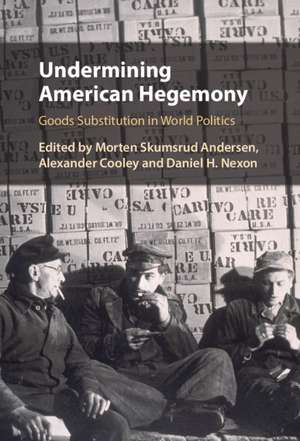Undermining American Hegemony: Goods Substitution in World Politics
Editat de Morten Skumsrud Andersen, Alexander Cooley, Daniel H. Nexonen Limba Engleză Hardback – 2 iun 2021
Preț: 582.00 lei
Preț vechi: 653.94 lei
-11% Nou
Puncte Express: 873
Preț estimativ în valută:
111.38€ • 115.85$ • 91.95£
111.38€ • 115.85$ • 91.95£
Carte tipărită la comandă
Livrare economică 15-29 aprilie
Preluare comenzi: 021 569.72.76
Specificații
ISBN-13: 9781108844970
ISBN-10: 1108844979
Pagini: 270
Dimensiuni: 158 x 236 x 19 mm
Greutate: 0.51 kg
Editura: Cambridge University Press
Colecția Cambridge University Press
Locul publicării:Cambridge, United Kingdom
ISBN-10: 1108844979
Pagini: 270
Dimensiuni: 158 x 236 x 19 mm
Greutate: 0.51 kg
Editura: Cambridge University Press
Colecția Cambridge University Press
Locul publicării:Cambridge, United Kingdom
Cuprins
Preface; List of abbreviations; 1. Goods substitution and the logics of international order transformation Daniel H. Nexon, Alexander Cooley and Morten Skumsrud Andersen; 2. Goods substitution and counter-hegemonic strategies Alexander Cooley and Daniel H. Nexon; 3. International rankings as normative goods: hegemony and the quest for social status Bahar Rumelili and Ann Towns; 4. China and the Asian infrastructure investment bank: undermining hegemony through goods substitution? Julia Bader; 5. The silk road to goods substitution: central Asia and the rise of new post-western international orders Alexander Cooley; 6. Goods substitution in the USA's back yard: Colombia's diversification strategies under conditions of hierarchy Morten Skumsrud Andersen; 7. Goods substitution at high latitude: undermining hegemony from below in the north Atlantic Rebecca Adler-Nissen, Benjamin De Carvalho and Halvard Leira; 8. Reflections on the volume Ole Jacob Sending and Iver B. Neumann; Bibliography; Index.
Recenzii
'What awaits us after American hegemony? Undermining Hegemony helps bring the bleary future into focus. Surrounding the subject to subdue it, the contributors of this volume show how ebbing U.S. influence shifts allegiances, alters autonomy, affects identities, and revises norms. But the arguments go beyond current events to enduring patterns. Anyone looking to understand how states large and small create international order should start with this book. Morton Skumsrud Andersen, Alexander Cooley, and Daniel Nexon have assembled a comprehensive work that is timely and timeless.' Joseph M. Parent, Professor of Political Science, University of Notre Dame
'This volume offers a fascinating analysis of how countries such as China and Russia are seeking to erode US-led liberal international order by contesting the United States' dominant role in providing global public goods in the economic, security and normative realm. Shedding light on the subject from several different angles, the authors succeed in deepening the reader's understanding of how political orders are maintained by the hegemon and challenged by other powers. The book thus makes a highly relevant contribution to the ongoing debate about the provision of international goods and the future of global order, a topic that has only gained importance in the context of the covid-19 pandemic.' Oliver Della Costa Stuenkel, Associate Professor, School of International Relations, Fundação Getulio Vargas (FGV)
'This volume offers a fascinating analysis of how countries such as China and Russia are seeking to erode US-led liberal international order by contesting the United States' dominant role in providing global public goods in the economic, security and normative realm. Shedding light on the subject from several different angles, the authors succeed in deepening the reader's understanding of how political orders are maintained by the hegemon and challenged by other powers. The book thus makes a highly relevant contribution to the ongoing debate about the provision of international goods and the future of global order, a topic that has only gained importance in the context of the covid-19 pandemic.' Oliver Della Costa Stuenkel, Associate Professor, School of International Relations, Fundação Getulio Vargas (FGV)
Descriere
Rather than direct confrontation, this book argues that competition over the provision and consumption of global public and private goods is shaping the decline of the liberal international order.
